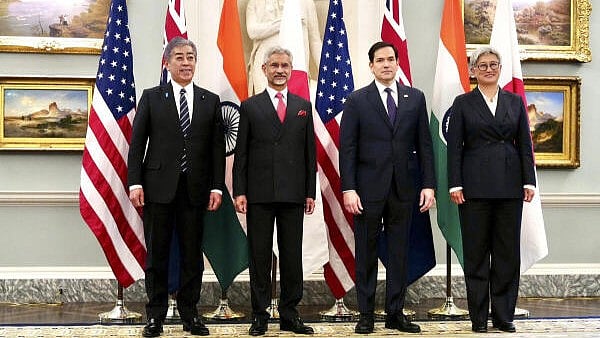
External Affairs Minister S Jaishankar, 2nd left, with Japanese Foreign Minister Takeshi Iwaya, left, US Secretary of State Marco Rubio, 2nd right, and Australia's Penny Wong during a Quad Foreign Ministers’ meeting, in Washington DC
Credit: PTI Photo
Washington: President Donald Trump’s administration in Washington DC has joined New Delhi, Canberra and Tokyo to send a strong message to China – making it clear that the Quad would continue to oppose any unilateral move by the communist country to change the status quo in the Indo-Pacific region.
Even as Trump threatened to impose a 10% duty on imports from China to the United States from February 1, his Secretary of State Marco Rubio joined foreign ministers of Japan, Australia and India in reaffirming the commitment to strengthening maritime, economic, and technology security in the Indo-Pacific region in the wake of hegemonic aspirations of the communist country.
“Our four nations maintain our conviction that international law, economic opportunity, peace, stability, and security in all domains including the maritime domain underpin the development and prosperity of the peoples of the Indo-Pacific,” Rubio and his counterparts – S Jaishankar of India, Penny Wong of Australia and Iwaya Takeshi of Japan – said in a joint statement after a meeting of the Quad Foreign Ministers. “We also strongly oppose any unilateral actions that seek to change the status quo by force or coercion,” they added in a not-so-subtle message to China.
Jaishankar, Wong, and Takeshi were in Washington, D.C, to attend the inauguration of Trump, who returned to the White House four years after his exit.
The meeting of the Quad foreign ministers in Washington, D.C, on Tuesday was the first formal international engagement of the Trump Administration after the 47th president of the United States took oath. It reaffirmed the new regime’s commitment to continue cooperation within the framework of the Quad – a four-nation coalition forged by India, Japan, Australia and the US to build a bulwark of democracies against China’s expansionist moves in the Indo-Pacific region.
It was also Rubio’s first plurilateral engagement after the US Senate confirmed him as the US Secretary of State.
Rubio, Jaishankar, Wong and Takeshi reaffirmed the shared commitment of the Quad to strengthening a free and open Indo-Pacific, where the rule of law, democratic values, sovereignty, and territorial integrity would continue to be upheld and defended.
“We are committed to strengthening regional maritime, economic, and technology security in the face of increasing threats, as well as promoting reliable and resilient supply chains,” they said in the joint statement issued after the meeting in Washington, D.C. “We look forward to advancing the work of the Quad in the coming months and will meet together on a regular basis as we prepare for the next Quad Leaders’ Summit hosted by India.”
Prime Minister Narendra Modi is likely to host the 5th in-person summit of the Quad in India later this year. The proposed summit may allow Trump to visit India for the second time as the president of the US. He had earlier visited Ahmedabad and New Delhi in February 2020 – just about a year before his first term in the White House came to its end.
The Quad was conceived in 2004 but fizzled out soon after its formal launch in 2007. The bloc was revived in 2017 during Trump’s first term as the US president.
New Delhi in the past resisted the US pressure to turn the Quad into a NATO-like security alliance for the Indo-Pacific. India rather insisted on pursuing a benign agenda to counter China’s bid to spread its military, political, and economic influence in the Indo-Pacific. Trump’s successor in the Oval Office of the White House, Joe Biden, played a key role in elevating it to the level of the leaders with a virtual summit in March 2021, followed by the first in-person summit in Washington DC a few months later.
Biden hosted Modi, Australian Prime Minister Anthony Albanese and then Japanese Prime Minister Fumio Kishida for the fourth in-person summit of the Quad in Delaware, US, on September 21, 2024. The leaders agreed to subtly add a security heft to the organisation, beginning with the coastguard ships of the four nations sailing together for a joint patrolling mission in the Indo-Pacific region in 2025.
The Quad has been opposing China’s muscle-flexing, be it along the country’s disputed boundary with India in the Himalayas, or in the East and South China Seas as well as in the Taiwan Strait. Though an Arbitral Tribunal constituted under the 1982 UNCLOS had delivered a unanimous decision several years ago rejecting China’s expansive claims on the South China Sea, Beijing had refused to adhere to it.
